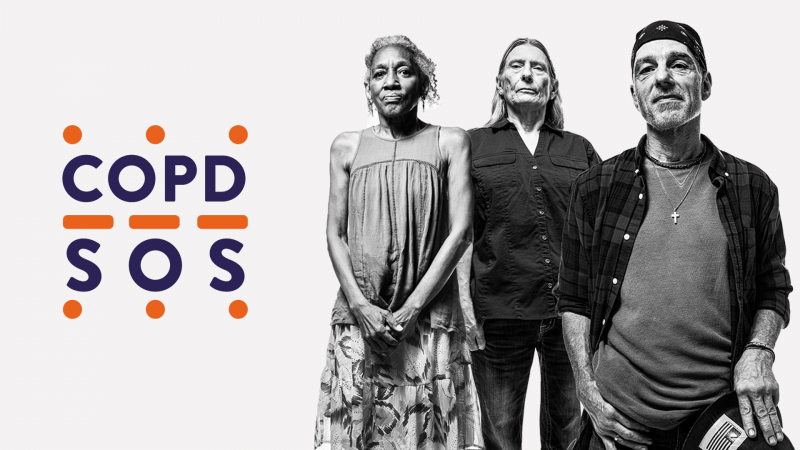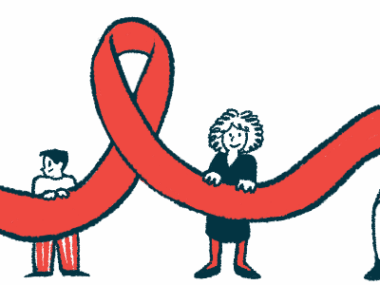COPD SOS Campaign Calls Attention to Millions in US Still Undiagnosed
Written by |

Photo courtesy of Dorney-Koppel Foundation
The COPD SOS campaign's banner image.
COPD SOS, a public service campaign spearheaded by veteran broadcast journalist Ted Koppel and his wife, is aimed at identifying the millions of people who don’t yet know that they have chronic obstructive pulmonary disease (COPD).
This disease is estimated to affect 30 million people in the U.S., with about half of them still undiagnosed. It is the third deadliest chronic disease in the world, according to the World Health Organization, but in the U.S. ranks 176th in federal funding.
According to the Centers for Disease Control and Prevention, about 40.5 in every 100,000 people died of COPD in 2019.
“If you took all the Americans who died in Korea, Vietnam, Iraq, and Afghanistan and added them all together, they would not amount to as many Americans who die in this country every year of COPD,” Koppel said in an interview with COPD News Today.
“I don’t know what more it takes to arouse a sense of action,” added Koppel, whose wife, Grace Anne Dorney Koppel, has severe COPD.
The Koppels’ nonprofit, the Dorney-Koppel Foundation, partnered with the COPD Foundation and the American Respiratory Foundation on the COPD SOS campaign, which began airing June 8 on major networks, including CNN, ABC, NBC, and CBS.
Its public service announcement features stories from various COPD patients, including 9/11 first responders, in New York, Louisiana, and West Virginia.
The campaign had been in the works for nearly four years, according to Koppel. It was ready to launch about a year and half ago, but with the health community focused on the COVID-19 pandemic, its organizers decided to delay the release.
Healthcare agency FCB Health New York also contributed to the project, with employees volunteering their resources to help create the campaign after realizing the scope of the COPD problem in the U.S., according to Megan McCann, a senior vice president and management director for the company.
The production crew that filmed the interviews, conducted by Koppel, were hired thanks to donations from GSK and Highmark Health.
A mutual friend introduced the Koppels to Brendan Ryan, former CEO of FCB Worldwide, the parent company of FCB Health, who connected the agency with their foundation.
From diagnosis to advocacy
The story behind the COPD SOS campaign, however, started much earlier, back when Dorney Koppel was diagnosed with COPD. At the time, doctors estimated she had three to five years to live. That was in 2001.
“After we got the news, we went back to the hotel and we just held each other all night long,” said Koppel, 81. “There was a lot of weeping going on.”
Dorney Koppel has since devoted herself to raising awareness about COPD and advocating for pulmonary rehabilitation, which she credits for helping her outlive her doctors’ expectations. Pulmonary rehabilitation is a personalized program that combines exercise with learning about the disease, how to properly take inhaled medications, and how to recognize a disease attack or exacerbation, and prevent hospitalizations.
“I do attribute winning this long with the disease to doing what everyone is told to do,” Dorney Koppel said, adding that exercise is important even if it feels like she can’t breathe. “So when I exercise every day, Ted says to me, ‘How far did you go?’ And I say, ‘Ted, I did my marathon.’”
Chief problems to address, according to the Koppels, are the too few centers specialized in pulmonary rehabilitation, doctors reluctant to prescribe a treatment course, and treatment that is poorly reimbursed by Medicare. In 2017, the Centers for Medicare and Medicaid Services significantly limited its reimbursement rates to hospitals for outpatient pulmonary rehabilitation because of a change in classification.
To date, the Koppels have co-funded or funded 10 pulmonary rehabilitation centers in West Virginia, Maryland, Kentucky, and Louisiana bearing Dorney Koppel’s name. The sites are in rural locations or environments with factors that can lead to COPD, such as using coal to heat the home.
“It changes lives,” Koppel said. “It saves lives.”
They also are pushing Congress to better fund research into COPD. “I worry sometimes that COPD patients are so beaten down that they are not active in terms of putting pressure on their own congressperson,” Koppel said.
Dorney Koppel stays active, serving as the president of the Dorney-Koppel Foundation, which they founded in 1999 and fund themselves. She is a member of the National Heart, Lung, and Blood Advisory Council, part of the National Institutes of Health. She also is a practicing attorney and her husband’s business manager.
Understanding symptoms
Awareness is vital to the success of federal funding for COPD. But it can also help people understand their symptoms, and be diagnosed at disease stages where treatments like pulmonary rehabilitation might be most effective.
That’s why part of the COPD SOS website includes a self-assessment survey that can help people understand their COPD risk and see if they have symptoms. Since the campaign launched, 113 people have filled out the survey.
The Koppels are enlisting the help of larger COPD organizations. They met with the COPD Foundation last year and shared some of the videos they had produced alongside FCB. The work impressed James Crapo, MD, board chairman of the COPD Foundation, and Ruth Tal-Singer, PhD, its president and chief scientific officer.
“We felt that this was the right time for a campaign like this, because people are aware after COVID-19 how important the breath is,” Tal-Singer said in an interview.
Tal-Singer, along with the Koppels and FCB Health, are hoping this nationwide call to action will inspire legislators to increase funding for COPD research, help more people with breathing difficulties become aware of the disease, and help the public better empathize with patients.
“Until you really experience breathlessness, you cannot comprehend what it’s like to live your life without being able to take a deep breath or be able to go up half a flight of stairs,” Dorney Koppel said.



